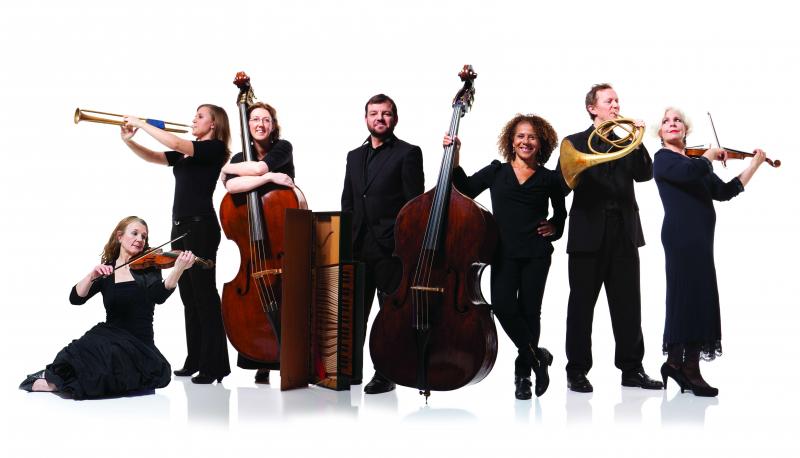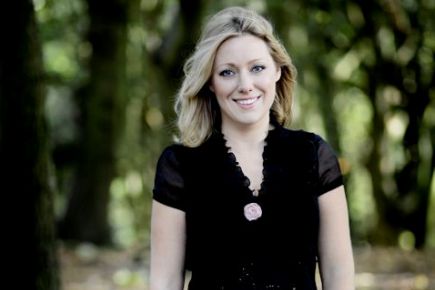Messiah, OAE, Howarth, Royal Festival Hall | reviews, news & interviews
Messiah, OAE, Howarth, Royal Festival Hall
Messiah, OAE, Howarth, Royal Festival Hall
An earthbound Messiah lacks wonder and urgency

Goldilocks would not have been a good conductor. There’s a reason why there isn’t a dynamic marking between mezzo forte and mezzo piano. Mezzo on its own would be a pretty bland state of affairs, sat solidly in an inoffensive state of not-too-loud-and-not-too-soft, not swelling to a crescendo or pining away to a decrescendo, but content with a steady sonic compromise.
Perhaps audiences are to blame. Or maybe concert halls. If Messiahs didn’t sell so reliably well then they wouldn’t be quite so ubiquitous. You can bet that Handel’s oratorio lurks behind most doors of the classical Advent calendar, and it’s an over-exposure that wearies the performers, turning an extraordinary piece of contemplative music-theatre into a string of musical bonbons – administered to pacify a restless audience, here for the hits.
Robert Howarth played things safe with choir and orchestra
It’s the only reason I can find for such a lacklustre performance from the OAE under Robert Howarth that never dared do more than what was necessary. The trouble started with Catherine Wyn-Rogers’ “But who may abide”, which lacked anything approaching awe. You’d think people were in the daily habit of “appearing like refiner’s fire” so casual was her delivery. Countertenors have an unfair advantage when it comes to the rapt stillness of “He was despised”, and Rogers never really made a case for her weightier mezzo tone, though the tenderness of the duet arrangement of “He shall feed his flock” came close. The RFH acoustic is unforgiving however, and the lowest passages simply didn’t carry, even to the front stalls.
 Better were John Mark Ainsley and Sophie Bevan (pictured, right), but neither on finest form. Ainsley’s lovely way with text couldn’t quite compensate for delivery that put rhetoric above beauty, letting moments that should arrest and beguile pass by uncherished. Bevan delivered the most touching performance of the evening, discovering convincing reassurance in “I know that my Redeemer” and rejoicing with animated coloratura, but the pitch of the drama was still slightly muted throughout, lacking the clarity (of tone and drama) that we’ve become accustomed to.
Better were John Mark Ainsley and Sophie Bevan (pictured, right), but neither on finest form. Ainsley’s lovely way with text couldn’t quite compensate for delivery that put rhetoric above beauty, letting moments that should arrest and beguile pass by uncherished. Bevan delivered the most touching performance of the evening, discovering convincing reassurance in “I know that my Redeemer” and rejoicing with animated coloratura, but the pitch of the drama was still slightly muted throughout, lacking the clarity (of tone and drama) that we’ve become accustomed to.
Ashley Riches (pictured, below left) is quietly carving a space for himself among more established British baritones, and here proved that he can do scampering coloratura wrath and lowering bass dread with equal skill. Narrating with operatic attention to detail, it was he who beckoned us into the story, who left us just a little less certain of the outcome of a tale we all know too well.
 Robert Howarth played things safe with choir and orchestra. Tiny details – consonants, dynamics, articulation – suggested less than meticulous preparation of the Choir of the Enlightenment, exposed in the sudden a capella nakedness of “Since by man” as less blended than the ensemble passages suggested. This crucial moment lacked that dangerous hush that can transform this mercurial passage from gimmick to musical philosophy. Was it really necessary to pause so pointedly (and lengthily) after “And he shall purify” until coughing and latecomers had done their worst? The RFH has surely seen enough of that particular trick already this month.
Robert Howarth played things safe with choir and orchestra. Tiny details – consonants, dynamics, articulation – suggested less than meticulous preparation of the Choir of the Enlightenment, exposed in the sudden a capella nakedness of “Since by man” as less blended than the ensemble passages suggested. This crucial moment lacked that dangerous hush that can transform this mercurial passage from gimmick to musical philosophy. Was it really necessary to pause so pointedly (and lengthily) after “And he shall purify” until coughing and latecomers had done their worst? The RFH has surely seen enough of that particular trick already this month.
The orchestra performed solidly, moments of gilded brilliance from the brass tempering slightly soft-focus strings. Had I heard this performance on the radio while wrapping Christmas presents and decorating the tree I’d have been more than satisfied. But as a foreground entertainment, a three-hour weeknight commitment, it simply didn’t make its case.
rating
Explore topics
Share this article
Add comment
The future of Arts Journalism
You can stop theartsdesk.com closing!
We urgently need financing to survive. Our fundraising drive has thus far raised £49,000 but we need to reach £100,000 or we will be forced to close. Please contribute here: https://gofund.me/c3f6033d
And if you can forward this information to anyone who might assist, we’d be grateful.

Subscribe to theartsdesk.com
Thank you for continuing to read our work on theartsdesk.com. For unlimited access to every article in its entirety, including our archive of more than 15,000 pieces, we're asking for £5 per month or £40 per year. We feel it's a very good deal, and hope you do too.
To take a subscription now simply click here.
And if you're looking for that extra gift for a friend or family member, why not treat them to a theartsdesk.com gift subscription?
more Classical music
 From Historical to Hip-Hop, Classically Black Music Festival, Kings Place review - a cluster of impressive stars for the future
From quasi-Mozartian elegance to the gritty humour of a kitchen inspection
From Historical to Hip-Hop, Classically Black Music Festival, Kings Place review - a cluster of impressive stars for the future
From quasi-Mozartian elegance to the gritty humour of a kitchen inspection
 Shibe, LSO, Adès, Barbican review - gaudy and glorious new music alongside serene Sibelius
Adès’s passion makes persuasive case for the music he loves, both new and old
Shibe, LSO, Adès, Barbican review - gaudy and glorious new music alongside serene Sibelius
Adès’s passion makes persuasive case for the music he loves, both new and old
 Anja Mittermüller, Richard Fu, Wigmore Hall review - a glorious hall debut
The Austrian mezzo shines - at the age of 22
Anja Mittermüller, Richard Fu, Wigmore Hall review - a glorious hall debut
The Austrian mezzo shines - at the age of 22
 First Person: clarinettist Oliver Pashley on the new horizons of The Hermes Experiment's latest album
Compositions by members of this unusual quartet feature for the first time
First Person: clarinettist Oliver Pashley on the new horizons of The Hermes Experiment's latest album
Compositions by members of this unusual quartet feature for the first time
 Gesualdo Passione, Les Arts Florissants, Amala Dior Company, Barbican review - inspired collaboration excavates the music's humanity
At times it was like watching an anarchic religious procession
Gesualdo Passione, Les Arts Florissants, Amala Dior Company, Barbican review - inspired collaboration excavates the music's humanity
At times it was like watching an anarchic religious procession
 Classical CDs: Camels, concrete and cabaret
An influential American composer's 90th birthday box, plus British piano concertos and a father-and-son duo
Classical CDs: Camels, concrete and cabaret
An influential American composer's 90th birthday box, plus British piano concertos and a father-and-son duo
 Cockerham, Manchester Camerata, Sheen, Martin Harris Centre, Manchester review - re-enacting the dawn of modernism
Two UK premieres added to three miniatures from a seminal event of January 1914
Cockerham, Manchester Camerata, Sheen, Martin Harris Centre, Manchester review - re-enacting the dawn of modernism
Two UK premieres added to three miniatures from a seminal event of January 1914
 Kempf, Brno Philharmonic, Davies, Bridgewater Hall, Manchester review - European tradition meets American jazz
Bouncing Czechs enjoy their Gershwin and Brubeck alongside Janáček and Dvořák
Kempf, Brno Philharmonic, Davies, Bridgewater Hall, Manchester review - European tradition meets American jazz
Bouncing Czechs enjoy their Gershwin and Brubeck alongside Janáček and Dvořák
 Solomon, OAE, Butt, QEH review - daft Biblical whitewashing with great choruses
Even a top soprano and mezzo can’t make this Handel paean wholly convincing
Solomon, OAE, Butt, QEH review - daft Biblical whitewashing with great choruses
Even a top soprano and mezzo can’t make this Handel paean wholly convincing
 Two-Piano Gala, Kings Place review - shining constellations
London Piano Festival curators and illustrious friends entertain and enlighten
Two-Piano Gala, Kings Place review - shining constellations
London Piano Festival curators and illustrious friends entertain and enlighten
 Echo Vocal Ensemble, Latto, Union Chapel review - eclectic choral programme garlanded with dance
Beautiful singing at the heart of an imaginative and stylistically varied concert
Echo Vocal Ensemble, Latto, Union Chapel review - eclectic choral programme garlanded with dance
Beautiful singing at the heart of an imaginative and stylistically varied concert
 Scott, Irish Baroque Orchestra, Whelan, RIAM, Dublin review - towards a Mozart masterpiece
Characteristic joy and enlightenment from this team, but a valveless horn brings problems
Scott, Irish Baroque Orchestra, Whelan, RIAM, Dublin review - towards a Mozart masterpiece
Characteristic joy and enlightenment from this team, but a valveless horn brings problems

Comments
It's a shame that Messiah is
What nonsense! It was a
I'm absolutely agree with
What a shame, especially